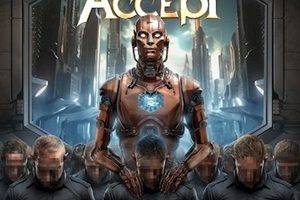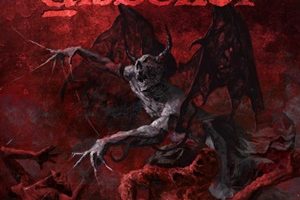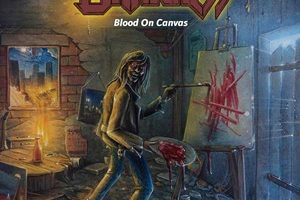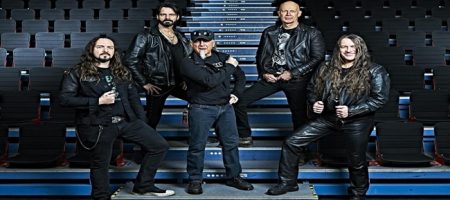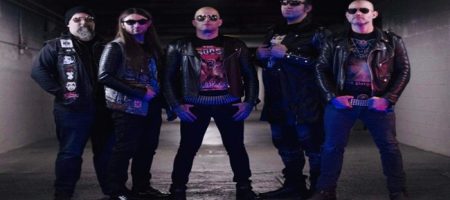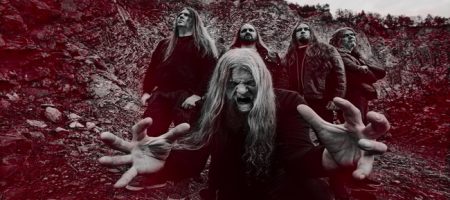Evile – Venture into the Unknown
Sunday, 2nd July 2023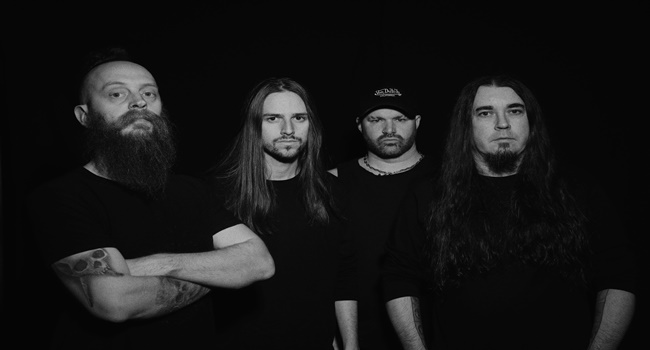
Photo Credit: Steve Dutton
Veteran artists often feel the need to explore new territory as they gain more confidence, seasoning, and experience at their craft. Well-equipped in the art of ripping thrash, Evile decided to explore heavier terrain while taking the pacing down a notch throughout their sixth studio record The Unknown. Most will notice a headbanging, groovier atmosphere in many of these songs, yet never relinquishing the trademark attack and tone that the band has been well known for. We reached out to guitarist/vocalist Ol Drake to bring us up to speed on this focused direction twist, the personal lyrical content that took place as a result of these songs, working with Eliran Kantor on this cover art, Ol’s improvement as a vocalist, the importance of buying physical media to support bands on the label front, plus touring / festival talk and future plans.
Dead Rhetoric: The Unknown is the sixth Evile album – taking a big step forward in terms of slower tempos and heavier approaches during many songs. How did the songwriting process for this set of material evolve, and were there specific experiences or circumstances that caused the more expansive shift in direction for the band?
Ol Drake: Yeah, I think it started out as a conscious decision because the last album was so fast. A million miles an hour, and we thought that we didn’t want to do the same thing again and release the same album twice. So, we thought let’s just flip (the album) on its head, the polar opposite, mostly slower and some mid-tempo stuff and still some fast stuff. It was a case of exploring all of these tempos that we’ve never explored. We looked at our back catalog, and noticed the songs were either really fast, or mid-tempo. Nothing as much in between, and we always wanted that, so we thought it was the perfect opportunity to do this now.
When you are playing the festivals, sometimes you are playing the fast stuff and people who have never heard of you they are looking at you like they can’t hear it. When you play the slower and heavier stuff, you can see heads bobbing. We knew we needed a few more of (those songs), so it was experimenting a little bit.
Dead Rhetoric: Was there a specific song or two that jump started this type of feel for the record?
Drake: I think just playing songs live and playing songs like “Head of the Demon”, “We Who Are About to Die”, “Bathed in Blood”, all the slower, heavier, bouncier riffs. Let’s just have some fun and do more stuff like that. We’ve always had slower and more mid-tempo stuff, and when “The Unknown” came out, people thought we had sold out. We’ve just changed the tempo, but it’s the same band.
Dead Rhetoric: Did you have any fears of backlash after releasing the first two singles from the album?
Drake: No, no worries at all. Over the years we’ve learned to not give a shit. We do it for us, if all four of us are happy with the music, that’s the criteria meant. It’s nobody else’s business. If you enjoy it, that’s great. If you don’t, don’t listen to it.
Dead Rhetoric: Tell us about the personalized lyrical themes you took on this time – including aspects of living with dementia, music industry struggles, and becoming a new parent? Do you believe this was a cathartic way of handling these topics through Evile to gain clarity over these events?
Drake: Yes, it was. When this album came around, and the lyric job started, it became evident that the typical war and demons kind of thing just did not fit the songs. The songs were much slower, making the vocals a little more vulnerable, your ears are drawn to the vocals more because there’s more space. As soon as I started, what else will work? The only other thing I know about is me. I wrote about things I’ve gone through, what people close to me have gone through. It just felt right, and I don’t mind opening up a bit, as there’s some really personal stuff on there, like “At Mirror’s Speech” and “When Mortal Coils Shed”. It lent to the song a lot better than the typical metal topics. It was interesting to do, because the more I did it, the more I was unloading, and it was cathartic.
Dead Rhetoric: How do you feel about your improvement as a vocalist this second time around? Did you spend more time/training to strengthen your voice and approach?
Drake: Yes, 100%. After Hell Unleashed, when I was doing the demos, I could taste blood in my throat. (Producer) Chris (Clancy) really helped me in the studio, but it just wasn’t right. I got in touch with Melissa Cross and said, ‘help’. She really did, she pointed me in the right direction, she showed me everything I needed to know. To be honest, I’m still learning now. There are things with my voice I’m like, why does it not work, how do I do this? I have spent the last two years obsessively training my voice, it still is a work in progress. We had a rehearsal today, and I thought I may have pushed things a bit too much. I’m still learning.
Dead Rhetoric: Is it tougher to approach the old songs because they weren’t written with you in mind?
Drake: No, the only songs I have to adapt a slight bit are on the first album, because on that first album Matt was in the same boat as I was on the last album where he didn’t know what he was doing. He was just shouting, damaging his voice. When I go back to that material, I have to add some melody to it, sing a note in the root note of the key. It’s hard to not sing, if you know what I mean. Other than that, Matt’s stuff really lends itself well to my voice.
Dead Rhetoric: You choose to work with Eliran Kantor for the cover art this time around. What did you enjoy about his output for Evile that maybe differs from the approach of Michael Whelan who worked with the band on Infected Nations and Hell Unleashed?
Drake: Eliran’s approach is really interesting. Obviously, Michael Whelan is amazing, mind-blowing, epic, and fantasy. Eliran, I really wanted to work with him because I met with him in Liverpool, and I talked about this. I had the concept about fatherhood, or the anxiety of becoming a father, and it turns out he’s a similar age as me and going through the same thing having kids. A while later he sent a few drafts over, and the one that you see on the cover is the one I said, that’s it. All I said to him was anxiety and fatherhood. Simple, not typically evil or metal, just striking. He sent that; it was great. I might have mentioned getting some blue colors in there, as we hadn’t had that on our previous albums.
Dead Rhetoric: Will that also apply maybe to different merchandise/image options for this album?
Drake: We are working on that at the moment. I’m toying with the idea of having just the art of the album on the front and the logo of the band on the back. You don’t see many shirts like that. I think there will be a few different options, definitely.
Dead Rhetoric: Tell us about the video shoot for the title track and the lyric video for “Reap What You Sow” – were these obvious single choices, and where do you see the importance of videos for promotion of the band during these social media platform times?
Drake: The title track was 100% everyone’s agreed, it has to be the single. “Reap What You Sow” was in all honestly, not the single. We sent everything to the label, we said here are our favorite songs, and the label came back and said, would you consider “Reap What You Sow”? I just said, no I didn’t think I had. I listened to it again, and it works. Because they mentioned it, it made sense.
Videos I still think are important today. Especially YouTube. Everything on social media is video based. Tik Tok, it’s all footage. Adam the new guy, he’s a lot younger than us in his early twenties. He is on social media a lot more than the rest of us. When he joined the band, he was like ‘why aren’t you doing this?’. I don’t know. He taught us a lot on the social media front, so I think videos are still hugely important.
Dead Rhetoric: Did he also discuss the importance of playthroughs that you do?
Drake: Yes, that was his idea too. We had done playthroughs before. I never had the goal in mind, it was release music, go on tour. To have a strategy, we’ve never approached things like that before so it’s good to have a plan. I like the reaction videos too – and I enjoy the ones that don’t like it. You can’t just concentrate on the good stuff and pretend the bad stuff’s not there. People are allowed an opinion, and if they don’t like it, they don’t like it. It’s all good.
Dead Rhetoric: Closing in on your 40’s, how would you say the Ol Drake of today differs in terms of his life perspective and musical ambitions compared to how you handled things during your 20’s and 30’s?
Drake: Wow! That is the most interesting question that I’ve been asked so far. I’d say it differs. When I was younger, I was all in for Evile. I sold everything I had to fund the band. I quit jobs so I could go tour. I had no responsibilities, no kids, no girlfriend at the time. Now, obviously, I have bills to pay, I have kids. I think I’m a bit more mature now. I’m a lot more careful with what we say yes to because I don’t like being away from my family for too long. Touring is an expensive hobby. I am a lot more careful and my back hurts a bit more (laughs).
Dead Rhetoric: Do you think the touring aspect is the most difficult thing for the average fan to understand, the decisions that have to be made within the band?
Drake: It’s a juggle between the touring aspect and the physical media. People don’t understand how important it is to buy CD’s and vinyl. The money and hours it takes to go into an album, you can only be recouped and paid back to the label through sales of the physical product. It’s great buying merch, it’s great going to gigs, but the only way to help a band on the label front is to buy the product. Your favorite bands, buy what you like, it really helps bands out. And touring, it’s so expensive now. We were trying to get to North America last year for Hell Unleashed. When we tallied up all the costs, we were deep into the red before we even set off. We just basically said, I guess we are not doing that then. Hopefully it will get better, and we can get some more time off of work. Festivals are more our thing right now, we can fly in, play, and fly out.
Dead Rhetoric: How do you see the state of the heavy music scene coming out of this prolonged pandemic? Do you think there is a newfound love/appreciation for entertainment and the arts as a result of the years away from live shows/touring opportunities?
Drake: 100% yes. Every gig we have played since the pandemic has felt different. The crowd and people are different. The popularity of heavy music in general, you have bands now like Lorna Shore, Fit For An Autopsy, they are just blowing up. I’m not a huge fan of that genre, but I appreciate it and respect it a lot. It’s great to see, there has been a real boom in heavy music since then. People are very hungry. I went to see Pantera in Berlin, I flew over to see that show, and it was one of the best shows I’ve ever been to. Everyone was insane, Pantera was perfect.
Dead Rhetoric: Have things gotten better for touring in the UK? You were worried in our last discussion about Brexit and how that would affect the market for tours there…
Drake: No, it’s gotten worse. Brexit has screwed a lot of things in terms of playing outside of the UK. A lot of smaller festivals have had to cancel. They will have an amazing lineup, and then two months before have to cancel because of low ticket sales. Everything is so expensive now; the economy is out of hand. Rent, mortgages, fuel, heating, and gas. I don’t get political ever, but our government is screwing us at the moment. Hopefully it turns around.
Dead Rhetoric: You’ve made a number of guest appearances on records over the years for other artists like Destruction, Gwar, and The Senseless among others – plus played live with acts like Destruction and Exhorder. What have been some of your favorite memories surrounding this work and the relationships you’ve developed with other artists in your career?
Drake: Gwar was definitely a highlight. Speaking with Dave (Oderus), he was such a funny, cool guy. There are so many great times. Destruction was great, they’ve been one of my favorite all-time thrash bands growing up. Our old bassist Mike, they were his favorite band, and he was still with us when I told him I was going to be playing in Destruction. Touring with Megadeth, and playing with Tim Minchin, an Australian comedian, that was great.
Dead Rhetoric: What have you been enjoying for music/releases as of late over the past three to six months?
Drake: It’s hard to say. I’ve been so deep into the Evile stuff, I haven’t listened to a lot of stuff. The new Metallica album was cool. A few tracks were amazing, some of them merged into one for me. I struggle to remember any new stuff. There’s a band from the UK called Tortured Demon, they are really good.
Dead Rhetoric: What has fatherhood been like for you, as a new father?
Drake: It’s been awesome. I say it’s like 95% amazing, but 5% hell. That 5% is hell. I came home from work and together, they run up to me and say, ‘Daddy!’. And that’s one of the best things to have, to come home to that.
Dead Rhetoric: What’s on the horizon for all things related to Evile in the next twelve months or so?
Drake: We are just trying to figure out the best way for us to get out there and play. Like we’ve said, touring is difficult, so festivals are perfect. We’ve got some coming up and trying to book our 2024 festivals for this album. Maybe another album will get started. I’m not in the mood or mindset to start another album just yet. When we worked on Hell Unleashed in the studio, I started writing this album. But this one was really hard. I might take a break. Some shows, maybe some singles outside of the album, I don’t know. We are just playing it by ear.











